With April as National Autism Awareness Month it’s wonderful to see yet another film approach autism with positivity and awareness. That film is JANE WANTS A BOYFRIEND. Written by Jarret Kerr and directed by Will Sullivan, JANE WANTS A BOYFRIEND takes a look at autism through the eyes of 20-something Jane, a high functioning girl with Asperger’s, alternating the point of view with that of Jane’s sister Bianca, an actress/bartender who is more than a little over-protective, and perhaps sometimes even a bit resentful, of Jane. Where we recently saw the effects of autism on a family and a caregiver to a young autistic girl in Janet Grillo’s “Jack of the Red Hearts”, here, Sullivan provides an emotionally fueled, more introspective viewpoint thanks to Kerr’s script focusing on a coming of age for Jane’s independence and romance. The result is a sweet showcase for Louisa Krause as Jane.
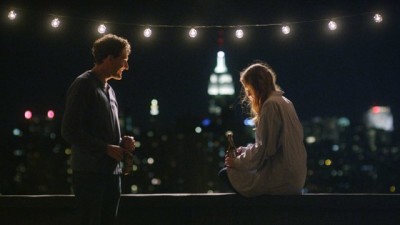
A costumer to the local theatre company in which Bianca has dreams of being the star of a new Shakespearean production, Jane is relatively self-sufficient, talented with a needle and thread, and craving to be just like her sister Bianca, including finding romance. And it’s not just about a boyfriend for Jane. It’s about romance; romance like what she sees in all the movies of the 30’s and 40’s which she obsessively watches to the point of memorizing a film’s dialogue. Living with her parents in the same house her entire life and always having her over-protective sister Bianca watching her every move, life takes a turn for both Jane and Bianca when their parents announce they are selling the family home in New Jersey and moving to the City.
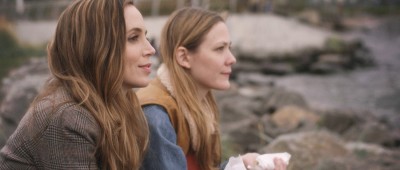
Always treating Jane as if she is incapable of being on her own and caring for herself, Bianca and her parents believe it now falls on Bianca to have Jane move in with Bianca and her boyfriend. While on the one hand Bianca sees the wisdom in this, on the other, the idea of Jane being constantly underfoot in her new live-in relationship with her boyfriend, takes its toll on Bianca; not to mention pulling her focus from her acting once she is cast as the lead in the new play. Causing further distraction for Bianca is her friend Jack who meets Jane for the first time at the bar in which she’s been working until this big acting break. Jack is enchanted by Jane and desperately wants to go out with her. Similarly, Jane is charmed by Jack and gets curious as to her attractiveness to the opposite sex. Bianca, however, wants to keep the two apart.
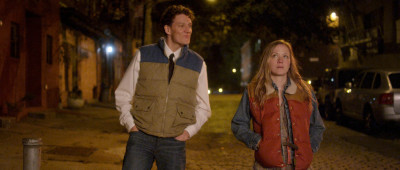
With a lot of sisterly pushing and shoving, we watch the sibling dynamic change and grow as each sister fights for what she thinks is right. For Bianca, that means protecting Jane. And for Jane, it means spreading her wings and finding her own bliss.
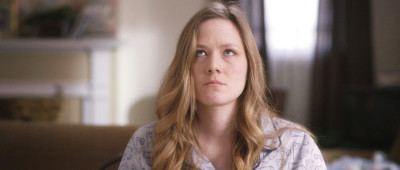
The shining star in JANE WANTS A BOYFRIEND is Louisa Krause. As Jane, she sparkles with wide-eyed wonder. You want to see Jane succeed and achieve all of her dreams. A key component to the character is her love of classic movies from the 30’s and 40’s, something that fuels Jane’s desire and image of love and the perfect man. Krause embraces the films and emulates the dialogue in Jane’s daily life with endearing charm. And just wait until you see Krause with Gabriel Ebert as Jack, the “normal” man who really likes Jane. Ebert has a shy, goofy, puppy dog eyed, Jimmy Stewart essence to him once Jack meets Jane that is sweetly charming. This is the guy very girl longs to meet.
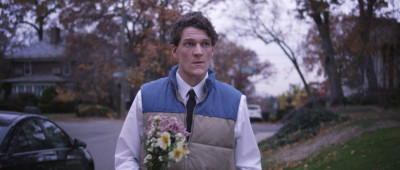
Surprisingly, Eliza Dushku falls flat as Bianca, particularly when performing in-character Shakespeare. (Could explain why she wasn’t a part of Joss Whedon alumni-filled “Much Ado About Nothing.) While Dushku nails the parent-daughter chemistry with Polly Draper and Gary Hilborn as well as with Amir Arison as boyfriend Rob, the sisterly bond and over-protectiveness between Dushku and Krause never feels truthful.
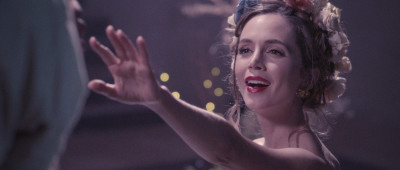
Director Will Sullivan and his cinematographer Brandon Roots are at their best when telling the story from Jane’s perspective, capitalizing on Jane’s obsession with old movies and her job with the theatre company, creating an almost magical rose-colored view of the world through Jane’s eyes. Color is saturated providing not only a beautifully polished look but one metaphoric of the senses and reality of Jane’s world. Ethereal beauty abounds within the theatre and set design for the Shakespearean play thanks to production designer Emmeline Wilks-Dupoise, something that Sullivan again, metaphorically showcases with overhead shots from the stage catwalks, providing us with a sense of Jane’s feeling of being on the outside looking in on life and love, as she does with her movies. Beautiful visual storytelling. Similarly, the camera doesn’t shy away from the struggles Jane has with the “normal” people and situations around her, calling on dutching and various lensing techniques as well as sound design to propel us into moments of trauma perfectly brought to life by Krause.
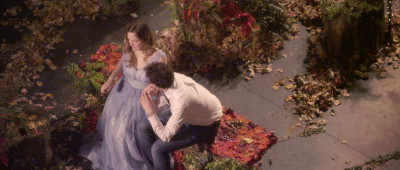
Although we learn very little in the script to give us a baseline for the different stages or types of autism so as to properly gauge the extent of Jane’s condition, it doesn’t detract from the emotional beauty and poetry which is brought to life by Louisa Krause, and Jane’s journey to find a boyfriend and herself.
And stay for the credits. You’re in for a real treat with an enchanting homage to Jane’s favorite movies as told through the budding relationship between Jack and Jane, lensed in black & white with a 16mm vintage feel.
Directed by Will Sullivan
Written by Jarret Kerr
Cast: Louisa Krause, Eliza Dushku, Gabriel Ebert, Amir Arison












